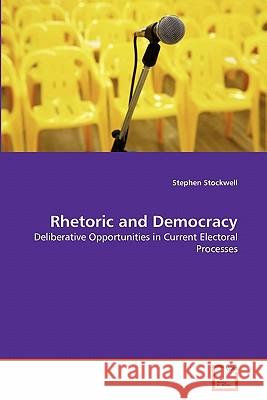Rhetoric and Democracy » książka
Rhetoric and Democracy
ISBN-13: 9783639301977 / Angielski / Miękka / 2010 / 248 str.
In moving beyond the dichotomy between representative and participatory models of democracy, contemporary democratic theory has drawn out the crucial role of deliberation in the effective operation of democratic institutions. However, while deliberation is applied to democratic effect in interpersonal relationships, new social movements, international negotiations and so on, there appears to be a hesitation in theorizing the means to improve the deliberative functions of existing representative institutions. This book argues that despite the many limitations of representative democracy, and of the mass media which act as its key deliberative forum, current models of representative democracy still offer formal and practical opportunities for collective deliberation in rhetorical exchanges among citizens, particularly, but by no means exclusively, in the course of election campaigns.
In moving beyond the dichotomy between representative and participatory models of democracy, contemporary democratic theory has drawn out the crucial role of deliberation in the effective operation of democratic institutions. However, while deliberation is applied to democratic effect in interpersonal relationships, new social movements, international negotiations and so on, there appears to be a hesitation in theorizing the means to improve the deliberative functions of existing representative institutions. This book argues that despite the many limitations of representative democracy, and of the mass media which act as its key deliberative forum, current models of representative democracy still offer formal and practical opportunities for collective deliberation in rhetorical exchanges among citizens, particularly, but by no means exclusively, in the course of election campaigns.











